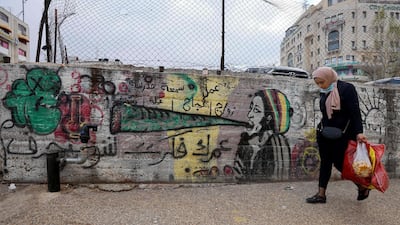The World Bank’s board has recommended the allocation of $80 million to support the economic welfare and durable opportunities for Palestinians.
The funds, in the form of grants, will be transferred from the bank’s income to the dedicated trust fund for Gaza and the West Bank, according to a statement from the Washington-based lender on Friday.
“In light of the Covid-19 pandemic, now in its second year, the impact of the May 2021 conflict with Gaza and the fiscal distress, the new replenishment comes at a critical time to help support Palestinian economic development while responding to these shocks to the economy and society,” Kanthan Shankar, World Bank country director for West Bank and Gaza, said.
World Bank country director for West Bank and Gaza
Last year was the worst on record for Palestinians in nearly three decades, as the Covid-19 pandemic compounded the effects of Israeli occupation, according to the United Nations Conference on Trade and Development (Unctad). A slow or inadequate recovery in 2021 will heighten the risk of bankruptcy for small and medium-sized enterprises brought to the brink by the pandemic, Unctad said in a September report.
The Palestinian economy shrank by 11.5 per cent in 2020, the second largest contraction since the establishment of the Palestinian National Authority in 1994, from growth of 1.4 per cent in 2019, according to Unctad data.
As economic activity ground to a halt last year, more than 66,000 employees lost their jobs and unemployment rose to 26 per cent. The labour force participation rate declined to 41 per cent in 2020, from 44 per cent in 2019. The crisis engulfed all sectors of the economy, including tourism, construction, services, industrial and agricultural sectors, Unctad said.
The World Bank approved a four-year strategy in May this year for Palestine that is focused on protecting lives and creating jobs amid the Covid-19 pandemic. The lender said earlier this year it expects the economy to grow by 3.5 per cent in 2021.
The funds, worth $80m, will support the bank’s assistance strategy, aimed at strengthening resilience and providing much-needed support for social protection, the World Bank said.
It also supports the recovery efforts in Gaza through cash-for-work opportunities for poor and vulnerable populations, and through the second phase of an energy sector multi-phase programmatic approach, according to the statement.
The funds will also contribute to a well-connected Palestinian economy that is more integrated into the regional and global markets with a particular focus on energy trade and digital connectivity. It will be particularly beneficial to private sector growth, including technology start-ups and the IT services sector, the statement added.
These efforts will help foster job creation and sustainable opportunities, the World Bank said.
Building on its partnership with the Palestinian Authority and co-ordination with donors, the World Bank Group will work with Palestinian policymakers to support the reform agenda in the priority areas of governance and public financial management, gender reform and climate change, as well as building investor confidence in the business environment, the statement said.
The World Bank granted an additional $9m to Palestine’s Innovative Private Sector Development Project in March to support start-ups and SMEs through financial and technical assistance.
It also approved a grant of $20m to improve access to high-speed broadband services in Palestinian territories in the same month.
The Palestinian Authority received 20 per cent less in international aid last year than in 2019, according to a World Bank report in February this year.
As a result, the authority faced a financing gap of about $1.1 billion last year, forcing it to deplete its reserves and start 2021 in “a tough fiscal position”.


